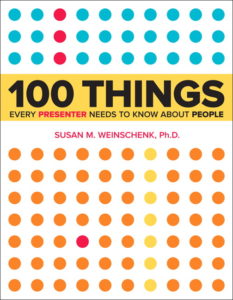Three Ways To Prevent People From Tuning You Out
Editor’s note: This guest post is part one of our week-long series, The Psychology of Public Speaking. All five posts in this series are excerpted from 100 Things Every Presenter Needs To Know About People by Susan Weinschenk.
I’m a staunch Apple convert. I wasn’t always an Apple fan. I used to be a Windows/PC person. Realize that I go all the way back to when PCs first came out. I used to have a marvelous “portable” PC that ran on a CPM operating system and had two (count ‘em, two) 360 KB (yes, I said KB) floppy disk drives (in other words, no hard drive). I was a PC person, not an Apple person. Apples were for teachers and then later, for artsy people.
That was not me.
Fast-forward to today and I will be talking on my iPhone, while charging my iPod for my afternoon exercise, while transferring a movie to my iPad from my MacBook Pro, which I might decide to watch on my television via Apple TV. What the heck happened here? (I describe the story of how I changed my loyalty from PCs to Apple in my book Neuro Web Design: What Makes Them Click. It’s a matter of starting with small changes and commitments and then growing to more loyalty.)
So you might be able to guess what happened when I went to dinner with a colleague who was showing me his Android phone. He loves his new Android phone and wanted to show me all the ways it was as good as, or better than, my iPhone. I was totally uninterested in hearing about it. I didn’t even want to look at it. Basically, I didn’t want to allow into my brain any information that would conflict with my opinion that nothing besides an iPhone was even a possibility. I was filtering the information.
People seek out and pay attention to information and cues that confirm their beliefs.
They don’t seek out—in fact, they ignore or even discount—information that doesn’t support what they already believe.
Filtering is often useful, since it reduces the amount of information we have to pay attention to at any one time. But filtering can sometimes lead to bad choices or a lack of action.
Psychologists call this filtering confirmation bias. People tend to favor information that confirms their existing beliefs. They tend to gather evidence and remember information selectively. The more strongly they believe something, the stronger the confirmation bias is.
How do you stop people from filtering?
When you are making a presentation, you want people to be open to the ideas that you are presenting. If they are doing a lot of filtering, then your ideas won’t have a chance of being heard. In order to get past the automatic filters that your audience may have, you may need to:
Start with what you know they believe. If you start your presentation with the opposite of what they believe, they may turn you off right away. For example, if you start a presentation to me by saying how amazing Android phones are or that Android phones are superior to iPhones, then you’ve likely lost me already. But if you start with an idea I agree with or know about—for example, how amazing iPhones are—then you have a chance of getting through to me.
Surprise people. One way to get past people’s filtering is to present them with information or an experience that they did not expect. For instance, I recently heard that over 50 percent of smartphone sales are Androids and only 33 percent are iPhones. That surprised me and made me stop and think, “Perhaps I should find out more about Android phones.”
Set up a situation of cognitive dissonance. In 1956, Leon Festinger wrote a book called When Prophecy Fails. In it, he describes the idea of cognitive dissonance, which is the uncomfortable feeling a person gets when they are presented with two ideas that they believe might both be true. For example, if I believe that I am a person who cares about others but I don’t give money to charitable causes, then I now have cognitive dissonance. The two ideas conflict with each other, and the cognitive dissonance will make me feel uncomfortable. I can either deny one of the ideas (for example, I can deny that I’m a caring person or deny that I didn’t give any money to charity this year) or change my behavior to get rid of the dissonance (for example, I might now be interested in giving a donation to the charity I hear a presentation on).
Copyright © 2012. Used with permission of PearsonEducation, Inc. and New Riders.
Interested in purchasing 100 Things Every Presenter Needs To Know About People? You can find the soft cover here and the Kindle edition here.




